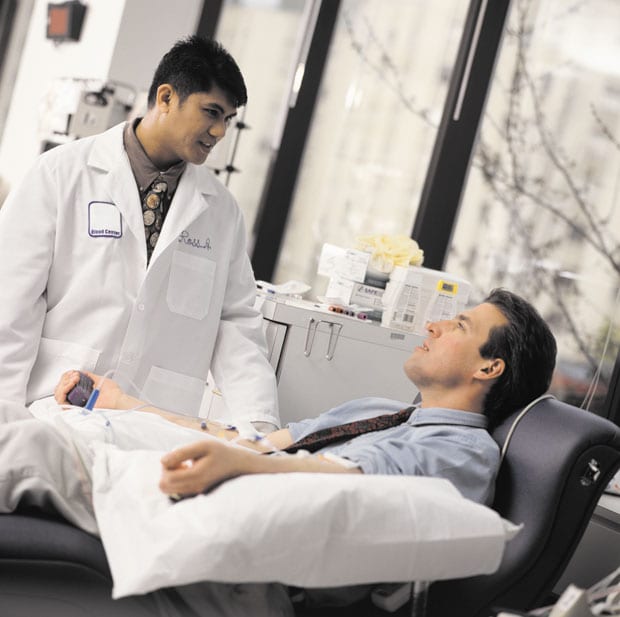Only gay men who have been celibate for at least a year are eligible to donate

DAVID TAFFET | Senior Staff Writer
The Food and Drug Administration issued new rules on blood donation by gay men this week, changing a 30-year-old policy disqualifying any man who has ever had sex with another man from donating blood in the U.S.
The new policy says men must wait 12 months after their last sexual contact with another man, mirroring blood donation rules in place in Great Britain and Australia, among other countries.
The FDA sets national standards for blood donation.
The ban on gay men donating blood was put in place near the beginning of the AIDS crisis, once it was understood that the virus causing AIDS could be passed through blood transfusion.
While most news reports of the policy change have claimed gay men may now donate blood, the new rule may add bisexual men who have had sex exclusively with women over the past year to the donation roles as well as that small portion of the gay male community that is celibate.
Gay men will only be allowed to donate blood if they claim to have abstained from sex for more than a year.
One of the safest groups of gay men to include in the donor pool would be married same-sex couples who test HIV-negative and are monogamous. But those couples are automatically excluded under the new policy.
Married heterosexual men who claim they are monogamous, however, are welcome to donate.
Before any blood is used, it is tested for a number of different pathogens, including HIV. According to FDA spokeswoman Tara Goodin, it can take up to nine days after contact for current tests to find HIV in the blood.
Dallas Voice spoke to Goodin on Tuesday. Goodin said she would refer additional questions to another spokesperson who didn’t send answers to written questions before press time.
AIDS Arms Executive Director John Carlo said human testing catches HIV infection in seven days and hematological testing is even faster.
While he called the new rule a step in the right direction, he said asking about behaviors is not a way to keep the blood supply safe.
“Because you’re gay or bi doesn’t mean you’re going to pass HIV through a blood transfusion,” he said. “And there are many people who are not gay living with HIV.”
He compared blood donation by a gay couple and a heterosexual couple.
“Chances are the gay, monogamous couple knows their HIV status,” he said, while a straight couple is much less likely to have been tested or know their status. That would be dangerous to the blood supply, if all blood weren’t tested.
Carlo questioned whether the one-year waiting period was just a time period people understood and was therefore used to make people feel safe.
Lambda Legal Midwest Public Information Officer Graciela Gonzalez said the new rules are “still discriminatory” and “doesn’t make the blood supply any safer.” She said basing the safety of blood on what people self-report is ridiculous.
Scott Schoettes is Lambda Legal’s HIV project director and a senior attorney. He said if blood banks are going to rely on self-reporting, it should be about behaviors, not categories.
“We need a donor questionnaire that gets at individual risk assessment,” he said.
There’s no reason to exclude all gay men, he said. But there may be reasons to exclude people who engaged in anal sex during a certain period of time prior to donation. That exclusion should apply to men or women, gay or straight.
“Of course they don’t want to ask those questions to the general public,” Schoettes said.
He said he doesn’t believe the restrictions are really about HIV anymore.
“It’s about the next transfusion-transmittable infection,” he said. TTIs, he explained, are blood-borne pathogens that can be transmitted.
Schoettes said the fear is those infections will originate in the gay community. But all donated blood is screened for Hepatitis B, Hepatitis C and West Nile Virus, and none of those originated in the gay community.
“Although the new policy is completely misguided, there’s a concern people will create a policy in their own head,” Schoettes said.
He said it will take time for local blood banks to ramp up to the new policy.
“Some people will lie,” he said. “The worst thing that could happen is if there’s any uptick in HIV in the donor supply — even if it’s caught and the blood isn’t used.”
He discouraged gay men from trying to donate blood.
“Comply with the policy — as misguided as it is,” he said.
This article appeared in the Dallas Voice print edition December 25, 2015.




